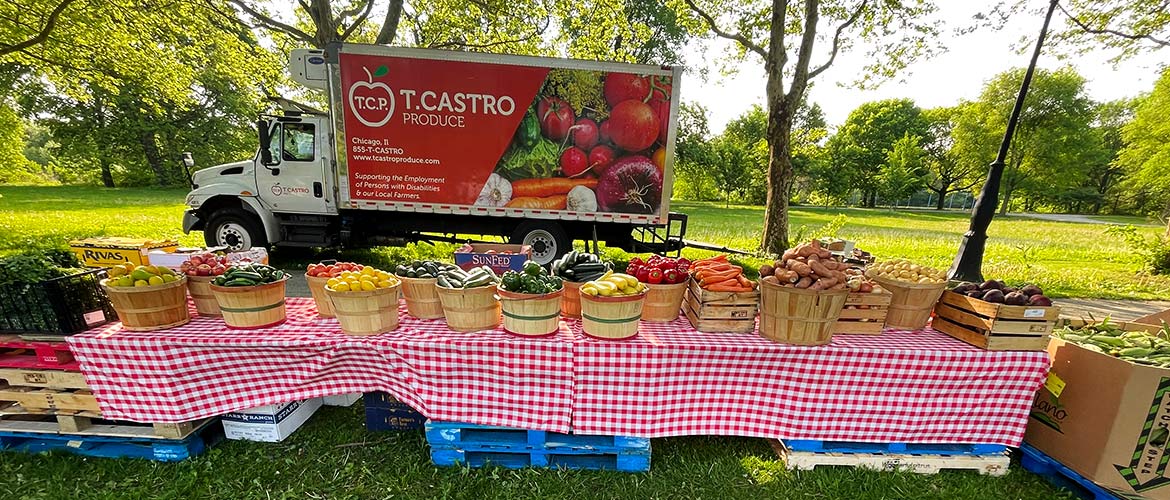Recognizing the essential role nutritious food plays in living a healthy life, Blue Cross and Blue Shield of Illinois (BCBSIL) during the first half of 2023 distributed $2 million of food in Illinois communities with the greatest needs.
According to Feeding America, the largest nonprofit working to end hunger in the U.S., over a million people are facing hunger in Illinois. With Supplemental Nutrition Assistance Program (SNAP) benefits reduced earlier this year due to the end of the federal COVID-19 Public Health Emergency declaration, the nearly 2 million Illinoisans depending on that money for food have increased the population facing hunger.
In a Feeding America survey, 95% of responding food banks reported seeing demand for food assistance increase since the decrease in SNAP benefits, with around 65% reporting an increase in the number of people seeking charitable food assistance.
BCBSIL has teamed with T. Castro, a 100-year-old family owned and operated produce company, to bring fresh fruits, vegetables and protein at no cost to community events and pop-up farmers markets throughout Illinois.
“Many people mention how helpful it is budgetarily to be able to skip the produce aisle at the grocery store,” says Matthew Prinske of T. Castro. “The awe and gratitude on people's faces when they see colorful, fresh produce makes me feel proud to be part of the event.”
From Cook, Lake, Dekalb and Will counties to Sangamon, Coles, McLean and Union counties, BCBSIL employees and volunteers crisscross the state to fulfill the mission of caring for members where they live, work and play, as well as their communities.
“Anna, Illinois, is the furthest location we’ve delivered to for a Blue Cross event,” says Prinske, whose drivers made the 350-mile trip to Southern Illinois to deliver food boxes on World Kidney Day earlier this year.
BCBSIL is committed to working with Business Enterprise Program (BEP) vendors — businesses owned by minorities, women and persons with disabilities. According to Tiffany Davis, BCBSIL executive director of quality improvement and health equity, BEP spending is an important part of the comapny's diversity and inclusion efforts.
“We looked at our BEP expenditure to target disproportionately impacted areas the state has listed,” Davis says. “T. Castro is run by a person with a disability, who qualifies as a BEP vendor.”
Heather Briggs, a BCBSIL Community Relations team member who covers Central and Southern Illinois, uses the state data to plan cooking and mental health classes, community care fairs and back-to-school events.
“When a request comes in to participate in an event, I begin by looking at that data and things like the number of seniors and children who live in that area,” Briggs explains. “There are so many people that could use fresh produce and a lot of great organizations trying to help. I want to make sure our resources are going where they’re most needed.”
Other event planning tools used by the Community Relations team include claims data and a population analytics and research tool that creates views of health and demographic characteristics at the community level. It contains BCBSIL-specific data as well as publicly available data.
The Community Relations team also uses the Care Van® to provide immunizations, dental sealants and health information throughout Illinois. Kevin Sloss, Care Van program manager, uses the population analytics and research tool in a couple different ways.
“When I’m planning, let’s say, a colorectal cancer screening event, I use the population analytics and research tool to determine areas that have a high concentration of members who have not received their recommended screening,” Sloss says, noting that BCBSIL focuses on chronic issues such as asthma, diabetes, hypertension, behavioral health and maternal and infant health.
“I can add a filter, like Medicaid members, to help find pockets of members most in need,” Sloss says. “Once the event is scheduled, I design the food boxes for the event with foods good for your colon, like non-starchy vegetables, fruits, nuts and beans. I also add a recipe card to give ideas on how to cook or use the food.”
Visit the Care Van schedule to look for scheduled community events.

